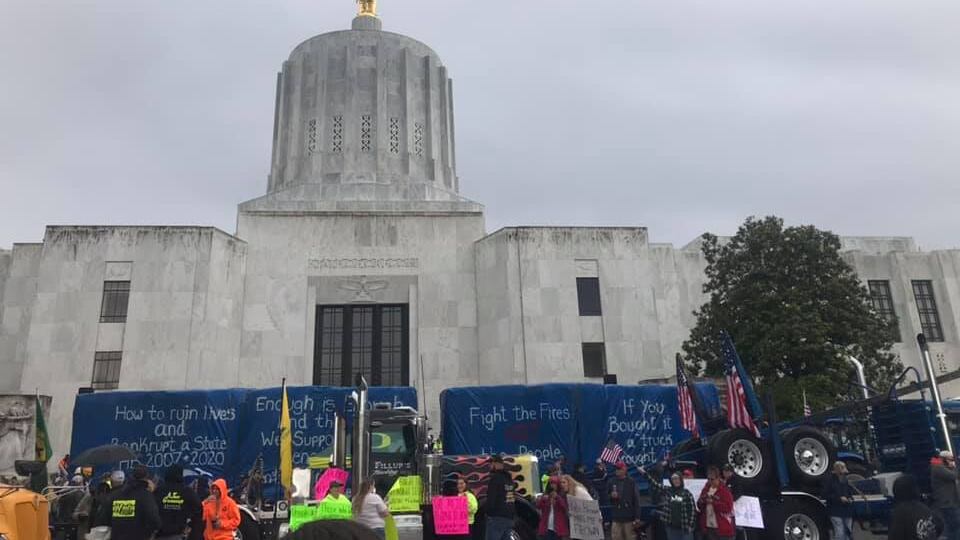Loggers and other opponents of House Bill 2020, the carbon-emissions reduction bill that went down in flames this week, rallied at the Capitol this morning in what was called the "Timber Unity" rally.
Logging trucks and equipment filled the rain-soaked streets in front of the Capitol. Critics of the Democrats' cap-and-trade proposal vented their anger at a policy they say would penalize rural Oregonians, who drive more miles and use more diesel-powered equipment than urbanites and would therefore be disproportionately impacted by mechanisms that drive up the price of fossil fuels.
The gathering came one week after the Senate Republicans walked off the job in order to block a vote on HB 2020.
One of those absent senators applauded today's event.
"We are staying strong," said state Sen. Kim Thatcher (R-Keizer) in a statement. "Timber Unity didn't just unify loggers and people against cap and trade. It unified Oregonians and showed the world—yes the world—we the people will put an end to the globalists' twisted agenda."
But previously undisclosed documents show the timber industry is far from unified.
Although the leaders of two of the state's largest and oldest timber companies—Andrew Miller of Stimson Lumber and Rob Freres of Freres Lumber—have been outspoken in their criticism of HB 2020 and Democrats' general approach to climate change, what hasn't been previously reported is that other large timber owners supported the bill.
Three letters to lawmakers, from Greenwood Industries, which manages 163,000 acres of Oregon timberland; from Hancock Forest Management, which manages more than 600,000 acres of Oregon timberland (and a total of 6.8 million acres nationally) and from Green Diamond Resource Company, which owns another 660,000 acres of Oregon timberland (and 1.8 million acres nationally) all expressed support for the controversial bill.
"Large scale problems require large-scale solutions and HB 2020 represents just such an approach," wrote Jeff Nuss, the president and CEO of Greenwood on June 5. "On behalf of Greenwood and our [70] Oregon-based employees, I ask that you support HB 2020."
Green Diamond, which has been managing forest since 1890, agreed.
"While we believe a national program would be preferable to a state-by-state approach, the work done here in Oregon can serve as a model for accessibility and flexibility that could be adopted as a regional or national approach," wrote Green Diamond's general manager, Andy Elsbree to the Joint Ways and Means Committee. "We are happy to support HB 2020 in its current form and encourage its passage."
Jerry Anderson, Hancock's region manager, also expressed his company's backing for the bill.
"Hancock supports responsible government policies to reduce atmospheric carbon dioxide and [that's] why we support HB 2020, which allows forest to play an important role in reaching collective goals," Anderson wrote June 13. "Managed, productive forests are Oregon's greatest asset in sequestering carbon."

